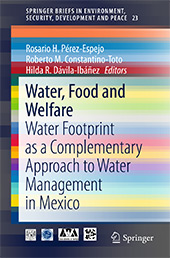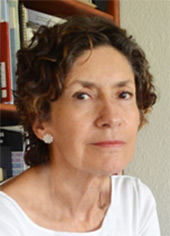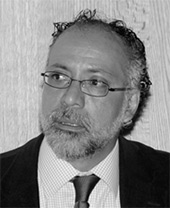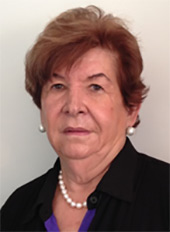

SpringerBriefs in
Environment, Security, Development and Peace (ESDP)
A Peer-reviewed Book Series
Edited by
Hans Günter Brauch,
AFES-PRESS, chairman
Free University of Berlin (Ret.)
 |
Rosario H. Pérez-Espejo, Roberto M. Constantino-Toto, Hilda R. Dávila-Ibáñez (Eds.): Water, Food and Welfare: Water Footprint as a Complementary Approach to Water. SpringerBriefs in Environment, Security, Development and Peace, vol. 23 (Cham– New York – Heidelberg – Dordrecht – London: Springer International Publishing, 2016).
ISBN (Print): 978-3-319-28822-2
ISBN (Online/eBook):978-3-319-28824-6
DOI: 10.1007/978-3-319-28824-6
Order this book on the Springer Website
|
| |
|
About this book
This book is the result of the cooperation of 16 researchers from eleven Mexican academic institutions. It addresses the following topics: the contemporary model for water management and alternative approaches; socioeconomic framework, water policy and institutions; water use for food purposes, water resources inventory and irrigation; manifestations of welfare loss, water prices; change in the dietary pattern and water security; hydrological stress and pressures on water availability; problems of groundwater management; vulnerability and climate change; water demand of major crops; gray water footprint and water pollution; gray water footprint and mining; virtual water and food trade; estimates of the water footprint of four key cereals, forages, livestock and bottled drinks and beverages.
-
Own estimates of the water footprint and a critical application of this methodology;
-
An overview of water management, water policies and institutions;
-
An analysis of the major factors affecting water resources in Mexico. .
On the Contents
Part I: Linking Water Management, Food Policy and Welfare – R. M. Constantino-Toto: Contemporary Model for Water Management and Alternative Approaches – H. R. Dávila- Ibáñez; R. H. Pérez- Espejo; T. Hernández-Amezcua: Socioeconomic Framework – R. H. Pérez- Espejo; T. Hernández- Amezcua; H. R. Dávila- Ibáñez: Water Policy and Institutions – R. Pérez- Espejo; T. Hernández- Amezcua; H. R. Dávila- Ibáñez: Water Use for Food Purposes – E. Gómez-Reyes – J. Garatuza- Payán – R. M. Constantino-Toto: Water Resources Inventory and Implications of Irrigation Modernization – Ú. Oswald Spring: Manifestations of Welfare Loss - R. M. Constantino-Toto: Prices and Water. A strategy With Limited Effectiveness.
Part II: Pressures on Water Availability, Its Use and Welfare Effects – E. Gómez-Reyes: Water Use Pattern – A. Santos-Baca: Change in the Dietary Pattern and Water Security - P. Phumpiu- Chang: Hydrological Stress and Pressures on Water Availability - E. Gómez-Reyes: Problems Associated with Groundwater Management - H. R. Dávila-Ibáñez; R. M. Constantino-Toto: Vulnerability and Climate Change
Part III: Methodology for Analyzing Water Footprint and Virtual Water - I. Sánchez- Cohen; E. Catalán-Valencia; J. Garatuza- Payán: Water Demand of Major Crops. A Methodology - A. M. Hansen: Gray Water Footprint and Water Pollution - G. Santacruz- De León; F. J. Peña-de Paz: Gray Footprint and Mining: Impact of Metal Extraction on Water - T. Hernández- Amezcua; A. Santos- Baca: Considerations on Virtual Water and Agri-food Trade
Part IV: Applying the WF Approach for Impact Analysis on Sectors and Regions - R. H. Pérez-Espejo; T. Hernández-Amezcua: Water Footprint of Four Cereals in Irrigation District 011 - I. Sánchez-Cohen; G. Delgado-Ramírez; G. Esquivel-Arriaga; P. Bueno-Hurtado - A. Román-López: Forage Water Footprint in the Comarca Lagunera - R. H. Pérez- Espejo; T. Hernández- Amezcua: Water Footprint in Livestock - R M. Constantino-Toto; D. Montero: Water Footprint of Bottled Drinks and Food Security
On the Editors
 |
Rosario H. Pérez-Espejo is an economist with a MSc in Agriculture Economics, a PhD in Animal Production and Health from UNAM. She is a full-time researcher with the Institute of Economic Research (IER) and member of the National Researchers System level II. She is professor at both the Graduate School of Economics and the Graduate School of Science in Animal Production and Health at UNAM. She is an expert of the FAO-LEAD (Livestock, Environment and Development) Initiative and author of books on economics, international trade and environmental problems of agriculture in Mexico. She is co-author of books regarding pig wastewater management; environmental regulations for intensive farms; the economics of nature; agriculture and water pollution. She has published over 110 articles in national and international journals and presented more than 120 papers in Mexico and other countries. Currently, she is developing a project on methane capture and water pollution in intensive pig farms, and on water and food security in Mexico. |
| |
|
|
Roberto M. Constantino-Toto studied economics at UAM and public policy at the ITAM. He is a member of the Water Network at UAM and of the Scientific Network of Water (Retac) with CONACYT. He works as a researcher on economic policy and natural resource Management at UAM-X. He has been director of the “Raul Anguiano” Department of Natural Resources and Sustainable Development (SEMARNAT/INE/UAM) as well as head of the economic policy and development research area at UAM. He has served on several national and international advisory committees regarding water management (CEC/NAFTA, Water System of Mexico City, the Water Sector Scientific Committee, Mexican Institute of Water Technology) and has led international research projects in the field of efficiency in the use of natural resources (REEO-UNEP). Recent publications include: Cultural Diversity and Water (2013), Strategies for Adaptation to Climate Change and its Institutional Effects on Labor Markets (2013).
|

|
| |
|
|
 |
Hilda R. Dávila-Ibáñez is a Research Professor of the Economic Production Department at UAM-X. She studied Economics at the Economics Department of the University of Nuevo Leon, holds a Master´s Degree in Economics from the New School for Social Research in New York City and a PhD from the UAM. Her research interests include income distribution, development, growth and environmental economics focused on the study of water management and policy about which she has published articles and book chapters. She lectures on Macroeconomic for the Master in Public Policy and Economics at UAM-X. |
| |
|
|
On the Authors
Palmira Bueno-Hurtado is an Agronomist and Phytotechnologist from the Agricultural College of the State of Guerrero with an MSc from the Autonomous University of Chapingo. Currently she works as a researcher at the Integrated Watershed Management INIFAP. Her research focuses on hydrological processes modeling.
Ernesto A. Catalán-Valencia is an Agricultural Engineer in Irrigation from the University of Sonora with an MSc in Hydrosciences from the Postgraduate College and a PhD in Agronomy from New Mexico State University. He is a researcher on water use engineering and an adviser for the research on water use and management in irrigation districts.
Gerardo Delgado-Ramírez is an Agricultural Engineer in Irrigation from the Agrarian Autonomous University Antonio Narro (UAAAN). He collaborated with the Integral Transfer Technology Program in Irrigation in the Laguna Region (PROTTIR) implemented by the Agricultural and Livestock Chamber of Torreon and the Farmers Association of the Laguna Region of Durango.
Gerardo Esquivel-Arriaga holds a MSc on Natural Resources and Environment from UACH. He currently works as a researcher in the Integrated Basin Management of the INIFAP. His research area is focused on the modeling of hydrological processes.
Jaime Garatuza-Payán is PhD in Hydrology, University of Arizona (1999). He has received awards, scholarships and research grants from the Universities Space Research Association, the UN, and different sources. He joined the Sonora Institute of Technology in 1990, where he is currently Director of the Department of Natural Resources,
Eugenio Gómez-Reyes is Research Professor "C" for the Department of Process Engineering and Hydraulics at UAM-I. He holds a MSc and a PhD from the State University of New York. He teaches Engineering Hydrology at UAM-I and has coordinated research projects and directed theses at graduate levels on hydrology, hydrodynamics and water quality in receiving bodies.
Anne M. Hansen has a PhD from UNAM and is a full-time researcher at IMTA. The Hydrogeochemistry Laboratory was created under her leadership to conduct research on the migration of contaminants and the formulation of preventive, corrective and conservative water measures. She teaches and leads graduate theses on environmental engineering and earth sciences.
Thalia Hernández-Amezcua holds an undergraduate Economics degree from the University of Guadalajara and Master´s in Economics from UNAM. She is currently working at the National Institute of Ecology and Climate Change (INECC) as Head of the Department of Economic Instruments. Her work deals with the design and analysis of studies for the identification and implementation of appropriate mitigation and climate change adaptation measures (NAMA) for Mexico.
Delia Montero is a full-time Research Professor “C” for the Economics Department at UAM-I. She is member of the National Researchers System Level I. She holds a PhD in Economics from the School of Higher Studies in Latin America (IHEAL) at the Sorbonne Nouvelle Paris III, France. She holds a Master’s Degree in Rural Development at the Institute for Economic and Social Studies (IEDES) in Paris, France and a BA in International Relations at UNAM.
Úrsula Oswald-Spring is a researcher at CRIM-UNAM and first Chair on Social Vulnerability at the United Nations University. She studied medicine, psychology, philosophy, languages, anthropology and ecology in Madagascar, Paris, Zürich and Mexico. She holds a PhD in Social Anthropology and Ecology from Zurich University. She is a member of the IPCC, the World Social Science Report and a reporting GEO-5-UNDP. She was Minister of the Environment for the State of Morelos (1994-1998) and the first Attorney of Ecology (1992-1994).
Francisco Javier Peña-de Paz has a PhD in Social Sciences specializing in Anthropology. He is a research fellow for the Water and Society Program at Colegio de San Luis and a member of the International Water Justice Alliance. His areas of study include: risk, cultural diversity and territorial construction, water crisis and water justice. He has conducted research in different parts of Mexico.
Patricia Phumpiu-Chang holds a PhD on Water and Soil Resources and Expertise in Environmental Engineering from the Royal Institute of Technology (KTH), Sweden and a Master's degree in Environmental Policy and regulation from the London School of Economics and Political Science (LSE), UK and in Urban Planning from the University of Pennsylvania, USA.
Abel Román-López is an Industrial Mechanical Engineer from the Technological Institute La Laguna # 13 and Master in Irrigation and Drainage from the Agrarian Autonomous University Antonio Narro. He has been an Irrigation Engineering Researcher at the CENIDs-BARK-INIFAP since 1980.
Ignacio Sánchez-Cohen is an Agronomist Engineer from the University of Sonora and PhD in Watershed Management on Physical Aspects of Arid Land from the University of Arizona. He is member of the National Center for Disciplinary Research in Foreign Soil Water Atmosphere Plant (CENIDRASPA) of the National Institute of Livestock Agriculture and Forestry Research (INIFAP).
Germán Santacruz-de León is a professor and researcher for the "Water and Society" program at the Colegio de San Luis and is a member of the National System of Researchers. He holds a PhD in Environmental Sciences from UASLP and Master’s degrees in Hydraulic Engineering from UNAM as well as Environmental Engineering from the National Polytechnic Institute. He is an Agronomist Engineer specializing in Irrigation from the Chapingo Autonomous University.
Andrea Santos-Baca graduated from the Economics Department at UNAM and holds a Master’s degree in Social Sciences from the Latin American Faculty of Social Sciences, Mexico campus. She has worked on consumer issues and economic dependence and recently on the effect of free trade on the dietary patterns in Mexico.
More on this theme in the Hexagon book Series